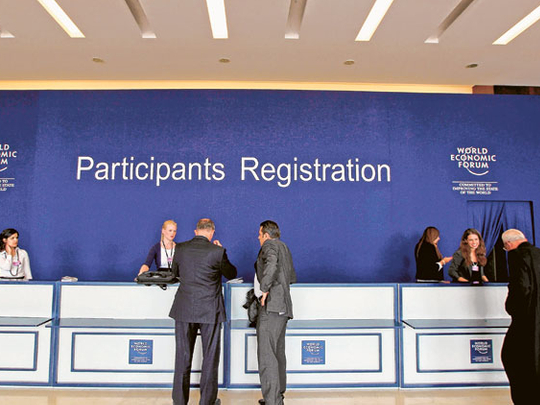
Dubai: A vastly changed political landscape in parts of the Middle East provides the backdrop for executives and officials from the Arab world gathered in Jordan for the region's yearly version of the annual World Economic Forum in Davos.
The three-day summit, which concludes tomorrow, has attracted more than 1,000 participants amid political upheaval in the wider Middle East and North Africa, a gloomy economic outlook for the US as well as Europe's ongoing sovereign debt crisis, to discuss pressing regional issues under the banner of ‘Economic growth and job creation in the Arab world'.
While the need for fostering economic growth and creating jobs isn't new, it has become ever-more important for the region's governments, faced with young and growing populations seeking better employment opportunities, reforms and greater political and personal freedoms.
A high rate of youth unemployment was one of the factors that spurred mass demonstrations in Egypt, Tunisia and Yemen earlier this year. With millions of young Arabs entering the labour market on an annual basis, unemployment will continue to be a problem that may provoke further dissatisfaction.
The labour market challenge is an enormous one. According to the World Economic Forum, the region needs to create 75 million jobs by 2020 — 40 per cent more than the number of jobs generated in 2011 — just to keep employment close to current levels.
"The biggest challenge — and, therefore, biggest priority — for the region's policymakers is how to provide the jobs that are needed by the young populations," said Simon Cooper, HSBC Bank Middle East's chief executive officer and deputy chairman.
But meeting the challenge won't be easy, even for oil exporters that have been able to spur economic growth by channelling billions of petrodollars into infrastructure projects and citizen benefits.
In March, King Abdullah Bin Abdul Aziz of Saudi Arabia announced that the world's largest oil exporter would embark on a massive spending programme on social benefits, with as much as $67 billion (Dh246.06 billion) to be spent on house-building alone to meet a domestic shortage. The spending came on top of the country's $400 billion, five-year infrastructure development programme already under way. Other Gulf states have embarked on similar, if smaller, spending programmes.
Economic forecast
The International Monetary Fund, in its latest World Economic Outlook published in September, forecast growth of 4.9 per cent for the region's oil exporters in 2011, with Qatar, Saudi Arabia and Iraq seeing especially strong growth due to high energy prices. But oil exporters will see their growth rates slip to a collective 3.9 per cent in 2012, it added, and weaker growth in the US and Europe could depress prices for the region's commodity exporters and reduce governments' ability to keep spending.
For oil importers, the picture looks gloomier. Countries like Egypt and Morocco, faced with continued social unrest that's slowing the recovery in tourism receipts and remittances, are predicted to grow at only 1.4 per cent this year, according to the IMF, even though that rate is seen rising to 2.6 per cent in 2012.
But even the relatively high growth rates seen in oil exporting states may not be enough to generate jobs on the scale needed to absorb the large numbers of young people entering the labour market every year.
"Economic growth over the past decade has not made any dent in the high regional unemployment rates as the working age demographics swamp even very strong and above-average economic growth," said Yasser Jarrar, Middle East strategy leader and Middle East deputy markets leader at PwC.
"Recent events in the Middle East have led to a range of short-term responses from governments in the region, especially increased government expenditures to relieve cost of living pressures and to create jobs. However, it is medium to longer-term fiscal policy matters that continue to require major reform to be sustainable," he added.
Moreover, the governments' traditional control of large swathes of the economy through either close associates or government-linked companies has restricted competition and opportunities for new entrants, while general business environments remain overly bureaucratic and anti-enterprise, Jarrar said.
Booz, the consulting firm, says: "The key to accelerating job creation will be fostering a business environment in which entrepreneurs can easily start new companies, spread innovation and spur economic activity in general."












